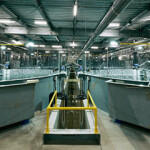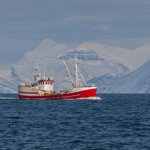Tyson Foods invests in Protix; Veolia Malaysia gets EU insect meal export approval

Springdale, Arkansas, U.S.A.-based Tyson Foods, Inc. – one of the world’s largest food companies – has invested in insect ingredients firm Protix.
Tyson Foods is responsible for producing around 20 percent of the beef, chicken, and pork consumed in the U.S., through the Tyson, Jimmy Dean, Hillshire Farm, Ball Park, Wright Brand, Aidells, and State Fair brands. Its direct equity investment, announced on 17 October, gives Tyson Foods a minority stake in Protix and involves a joint venture for the operation and construction of a U.S. insect ingredients facility.
“Upon completion, it will be the first at-scale facility of its kind to upcycle food manufacturing byproducts into high-quality insect proteins and lipids which will primarily be used in the pet food, aquaculture, and livestock industries,” Tyson Foods said. “The partnership represents Tyson Foods’ commitment to continuous innovation, business growth, and working towards sustainable solutions, opening a new revenue stream while accelerating Protix’s international expansion.”
Dongen, The Netherlands-based Protix r has developed a range of products made from the larvae of black soldier flies (Hermetia illucens), including ProteinX, which is being used in hatchery and grower diets for salmon, trout, shrimp, and other fish. The company played a leading role in pushing for insect protein to be approved for use in aquaculture within the European Union in 2017, following a protracted campaign by the International Platform of Insects for Food and Feed (IPIFF), which it co-founded. It raised EUR 50 million (USD 57.2 million) in equity to fund its international growth and research and development program in 2022. Its Dongen plant has been operational since 2019 and currently produces 14,000 metric tons of liquid-liquid extraction (LLE) annually.
“Our partnership with Protix represents the latest strategic investment by Tyson Foods in groundbreaking solutions that drive added value to Tyson Foods’ business,” Tyson Foods Chief Financial Officer John R. Tyson said. “The insect lifecycle provides the opportunity for full circularity within our value chain, strengthening our commitment to building a more sustainable food system for the future.”
Protix CEO and Founder Kees Aarts said the agreement “combines Tyson Foods’ global scale, experience, and network with Protix’s technology and market leadership to meet current market demand and scale production of insect ingredients.”
“Tyson Foods’ and Protix’s strategic partnership advances our joint work towards creating high-quality, more sustainable protein using innovative technology and solutions,” he said. “Moreover, we can immediately use their existing byproducts as feedstock for our insects. This agreement is a major milestone for Protix and significantly accelerates our ambition to grow through international partnerships.”
No site has yet been selected for the planned U.S. plant, which Aarts said won’t be ready before 2025. However, the plan is for it to be as much as four times bigger than Protix’s existing facility in the Netherlands, and it will house an end-to-end processing system for bug-protein production, including breeding, incubating, and hatching facilities.
“It is definitely a huge way to establish ourselves into an international context,” Aarts told Bloomberg News. “This was really the tipping point we have been working for.”
Tyson rivals Cargill and Archer-Daniels-Midland (ADM) have already formed insect-protein partnerships with InnovaFeed. Tyson said his firm also sees promise in alternative feed ingredients.
“It’s a multibillion-dollar industry opportunity that has tremendous growth potential, and we see Protix as being a leader there,” he said. “In the long run, insect-protein inclusion in animal-feed diets can be a real thing that exists and can be one that is good for people, planet, and animals.”
Separately, Veolia Bioconversion Malaysia, one of the largest insect protein producers in Asia, with a production capacity of 3,000 tons of insect products per year, has been approved to export its insect meal and oil exports to the European Union.
On 13 October, the company announced it had received approval from the Malaysian Ministry of Agriculture in Malaysia to export its Entomeal insect meal product and Entolipid, its insect oil product, to European markets for use in pet food, aquafeed, and livestock feed.
The Trade Control and Expert System (TRACES) approval means the company’s products are produced to E.U. industrial standards and are fully compliant with E.U. regulations to be used in animal feed applications, the company said.
“TRACES ensures the safety and full traceability from feedstock to finished products of our production,” it said. “We aim to provide our clients with high product quality and consistent supply to meet the rising European market demands.”
Veolia Bioconversion Malaysia General Manager Fabrice Latchoumanin said his firm has found “optimal conditions” for growing black soldier fly larvae in Malaysia.
“There is an increasing requirement for sustainable, and functional ingredients in the pet food and the aqua feed industry,” Latchoumanin said. “Insect-based feed offers many benefits for these applications such as high digestibility and nutritious feed source. We are thrilled to provide a sustainable alternative source of protein to the European market."
Photo courtesy of Protix






Share